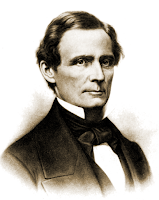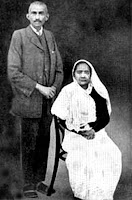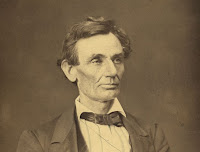n
n
n
n
n
n
n
 It’s the date that, a year later, Jefferson Davis was elected president of the short-lived Confederate States of America.
It’s the date that, a year later, Jefferson Davis was elected president of the short-lived Confederate States of America.n
n
n
n
n
 And it’s the date that, in 1914, Mohandas Gandhi was arrested while leading a march of Indian miners in South Africa.
And it’s the date that, in 1914, Mohandas Gandhi was arrested while leading a march of Indian miners in South Africa.n
n
n
n
n
n
n
n
n
n
n
n
n
n
n
n
n
n
n
n
n
 Sure, crowds flocked to hear him speak, people followed him, and he won the Nobel Peace Prize. But he was also vilified, arrested and imprisoned, threatened and beaten and bombed and stabbed and shot at and – of course – finally killed.
Sure, crowds flocked to hear him speak, people followed him, and he won the Nobel Peace Prize. But he was also vilified, arrested and imprisoned, threatened and beaten and bombed and stabbed and shot at and – of course – finally killed. n
nAt the time of his death, about 75% of Americans disapproved of him.
n
n
nDoes that shock you? Today more than 90% of Americans approve of him; we celebrate him with a national memorial and multiple postage stamps, loads of places and institutions named after him, statues and plaques; we almost revere him.
n
n
n
n
nWhen we see how hindsight has changed our view of MLK so much – going from a 75% negative approval rating at the time of his death to 90%+ positive approval rating now! – we can see that time very much impacts our judgement of people.
n
n
n
n
n
n
 Mohandas Gandhi is now almost universally called Mahatma Gandhi; Mahatma means wise one and is a title reserved for those who are lovingly respected.
Mohandas Gandhi is now almost universally called Mahatma Gandhi; Mahatma means wise one and is a title reserved for those who are lovingly respected. n
nOf course, Gandhi was human – he was flawed – he definitely wasn’t perfect. During his lifetime he was harshly criticized and hated, by some, and praised and even revered, by others. Most of us consider him in the “hero” category now – so much so that many think that “Mahatma” is his first name.
n
nGandhi fought against racial discrimination and the caste system, he campaigned for independence using peaceful civil disobedience and non-cooperation, he traveled to areas on unrest and tried to bring peace between peoples.
n
n
n
n
n
n
n
n
n
n
n
nLincoln vs. Davis
n
n
 Everyone knows Abraham Lincoln’s a hero. I mean, he’s got a prominent memorial in D.C., his face is all over U.S. money and on Mount Rushmore, and and and – well, I could go on. Most polls of historians and scholars rank Lincoln as the #1 best president in U.S. history – and 12 out of 20 rankings of Lincoln by historians / scholars in polls listed by Wikipedia are #1, with six polls ranking him #2 and two ranking him #3.
Everyone knows Abraham Lincoln’s a hero. I mean, he’s got a prominent memorial in D.C., his face is all over U.S. money and on Mount Rushmore, and and and – well, I could go on. Most polls of historians and scholars rank Lincoln as the #1 best president in U.S. history – and 12 out of 20 rankings of Lincoln by historians / scholars in polls listed by Wikipedia are #1, with six polls ranking him #2 and two ranking him #3. n
n
n
nLincoln preserved the Union during a terrible and terribly dangerous time, he freed the slaves, and with victory almost sure he made plans for amnesty for the “Rebels” and a humane reconstruction of the South. His 1863 Proclamation of Amnesty and Reconstruction allowed a full pardon of, along with a restoration of property to, everyone who had rebelled against the nation, except the highest Confederate officials and military leaders.
n
nOf course, the Civil War was a vicious, costly, gruesomely deadly tear in the nation. It’s not exaggeration to say that brother fought against brother, and many families and friendships were shattered before and during the war. So it wasn’t going to be easy for Lincoln to heal these wounds.
n
nMany Confederates found it difficult to swallow the fact that the slaves were free. Many Radical Republicans of the North thought that Lincoln’s plan was much too easy on the South.
n
n But Lincoln had proved himself a leader, and many were willing to sign onto the plan under that leadership. When Lincoln was assassinated, however, Reconstruction efforts were badly hurt. The strife of the war was replaced by strife over whether to punish the South or to try for Lincoln’s more conciliatory ideas.
But Lincoln had proved himself a leader, and many were willing to sign onto the plan under that leadership. When Lincoln was assassinated, however, Reconstruction efforts were badly hurt. The strife of the war was replaced by strife over whether to punish the South or to try for Lincoln’s more conciliatory ideas.
n
n
n
nDid you notice that Lincoln’s proclamation promised a full pardon to all but the highest Confederate officials? Well, that would have to include Jefferson Davis, the President of the Confederate States of America. He was arrested by Union soldiers on May 10, 1865, less than a month after Lincoln’s assassination, and he was confined to a small room at Fort Monroe, in Virginia, monitored by soldiers who made sure that he ate and made no attempt to escape nor to commit suicide.
n
nAfter no link was found between Davis and Lincoln’s assassination, Davis was moved to a larger space in the officers’ hall. He was then allowed visitors and exercise, and eventually his wife moved to the fort to be with him. Some people claimed that Davis was treated poorly, but apparently Davis himself did not believe that to be true.
n
n
n
n
n
nAfter two years of imprisonment as a military prisoner, he was transferred to civilian custody and then released on bail.
n
nMany Americans thought that Davis should be punished for leading a rebellion against the nation, for treason, or at least for mistreatment of Union prisoners of war. U.S. President Andrew Johnson thought he should be charged for murder (I guess he thought for sure that Davis was “in” on the assassination). Many people wrote to the president with requests that Davis be hanged and a few offers to personally build the gallows!
n
nOn the other hand, many Americans from the North opposed punishing Jefferson Davis personally. Some of them wanted to punish the former Confederacy as a whole, and others wanted to just move forward.
n
n Johnson finally decided that treason was the best charge, and Davis demanded a trial in order to make the case that states could secede. There were a LOT of delays to the trial – and President Johnson was impeached although not removed from office – and there was a request made to the U.S. Supreme Court on whether or not to dismiss the charges.
Johnson finally decided that treason was the best charge, and Davis demanded a trial in order to make the case that states could secede. There were a LOT of delays to the trial – and President Johnson was impeached although not removed from office – and there was a request made to the U.S. Supreme Court on whether or not to dismiss the charges.
n
nWith all of that mess hanging over everyone’s heads, Johnson ended up releasing an amnesty proclamation on Christmas Day in 1868. This amnesty pardoned EVERYONE, even the top officials and military leaders of the Confederacy.
n
nJefferson Davis was a free man and began to write a book about the rise and fall of the Confederacy. He encouraged reconciliation, and he urged Southerners to be loyal to the Union.
n
nDavis hadn’t been disgraced, exactly, but his lack of leadership skills during the Civil War meant that Davis wasn’t the most fabulously exalted hero in the South. (General Robert E. Lee, for example, was much more popular with Southerners immediately after the war.) However, the memories of Davis’s leadership problems began to fade as the years went by, and he became more a more a symbol to many of Southern pride. He became a hero to a lost cause.
n
n
n
 |
| Can you imagine if Germany glorified Hitler and other Nazis with statues and every other street being named for them, plus Nazi flags? It’s…unthinkable! |
n
nAnd a statue honoring Jefferson Davis sits right smack dab in the halls of the Capitol, honored along with figures such as George Washington and Helen Keller, Sakakawea (often known as Sacagawea) and Thomas Edison, Dwight D. Eisenhower and artist Charles Russell.
n
n
n
n
nWhhhhyyyyy? The reason that Davis (and Lee and eight other Confederates) are honored by statuary at the Capitol is because each state is allowed two choices for statues of honored citizens. Representative Bennie Thompson of Mississippi called on lawmakers of both parties to remove permanently all the “Confederate imagery” from the Capitol, saying that “these images symbolize a time of racial discrimination and segregation that continues to haunt this country and many African-Americans who still to this day face racism and bigotry.” That was back in 2015, and Republican lawmakers wouldn’t even allow a vote on the resolution.
n
nMore recently, Representative Cedric Richmond of Louisiana has suggested that lawmakers consider removing Confederate statues out of the Capitol. He said, “We will never solve America’s race problem if we continue to honor traitors who fought against the United States in order to keep African Americans in chains…By the way, thank God, they lost.”
n
n
n
 |
| This is another elementary magnet school named after Obama – this one in Georgia! |
nSo far these pleas to remove Confederate statues and other images that glorify or honor Confederate “heroes” or “traitors” have gained little traction. On the other hand, some places and institutions named after Jefferson Davis and other Confederates may choose to change their name. A school in Mississippi named after Davis is now called the Barack Obama Magnet International Baccalaureate Elementary School. An article about the change concluded with the words, “There is no sense in honoring the men who attempted to split the United States so they could maintain the practice of slavery.“
n
n
n
n
n
nAlso on this date:
n
n
n
n
n
n
n
n
n
n
n
n
n
n
n
n
n
n
n
n
n
n
n
n
n
n
n
n
n
n
n
n
n
n
n
n
n
n
n
n
n
n
n
n
n
n
n
n
n
n
n
nPlan ahead:
n
n
n
- n
-
nNovember holidays
n
-
nNovember birthdays
n
-
nHistorical anniversaries in November
n
n
n
n
n
n
n
- n
-
n
-
n
-
nHistorical anniversaries in December
n
n
n
n
n
n
n


















